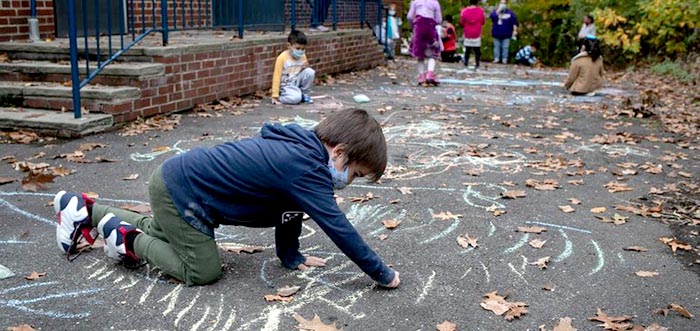
From K-12 Dive
By Anna Merod
Feb. 18, 2022
Dive Brief:
Children need recess more than ever now, considering they’ve grown up during the COVID-19 pandemic — one of the largest mass trauma events since World War II, said Rebecca London, an associate professor in sociology at the University of California, Santa Cruz.
From 2002 to 2015, the No Child Left Behind law caused schools and districts to shift away from recess and focus more on preparing students to perform well on standardized tests, London said.
Since NCLB, experts said they’ve noticed a gradual movement where schools are focusing more on free playtime, as education leaders prioritize students’ well-being and social-emotional development along with their academic success.
Dive Insight:
While recess used to be viewed as something that took away from learning, experts have come to understand that recess can improve children’s focus and success in the classroom by providing a well-needed break.
As schools look to recovering from learning loss exacerbated by COVID-19 disruptions, advocates don’t think it’s likely recess could be taken away again.
Recess benefits not just academics, but also students’ mental health and social-emotional learning, said Kate Holmes, senior manager at Springboard to Active Schools, an initiative of the National Network of Public Health Institutes and Health Resources in Action.
“It’s not something that’s taking away time for students. It’s something that really enhances their school day, their overall well-being,” Holmes said.
In a recent RAND Corp. survey, school district leaders named mental health of students and staff as their top concern over any other school issue.
Recess can also be a laboratory for social-emotional skills by helping students practice problem-solving, negotiation, sharing and communication, Holmes said.
“To practice these social-emotional skills are important all the time, but especially during the COVID-19 pandemic when we see students really struggling with a lot of these things,” Holmes said.
Recess can also be a trauma-informed free play practice to help students manage their emotions, said Michelle Carter, director of educational content and programs at the Society of Health and Physical Educators.
“Most of movement for kids does happen at school, so the more opportunities we can provide for them, I think, the better,” Carter said.
While the Centers for Disease Control and Prevention recommends a minimum of 20 minutes of free play for elementary students daily, London said recess should be at least 40 minutes daily.
A productive break, London said, should include some mix between structure and free play. It’s important for students to have an adult not just supervise them on the playground, but also serve as a role model for play, she said.
Being intentional with recess time is critical to help students deal with trauma, feel rested and be ready to engage in school work, London said.
“If we’re going to give a recess and we want kids to get something out of it, we can’t just throw them all out on the play yard and hope for the best,” London said. “There needs to be a little forethought. How can we incorporate recess into our school climate initiative? How can we incorporate recess into our positive behavior system?”
Photo: John Moore via Getty Images
Read this and other stories at K-12 Dive

